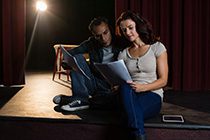Conduct an amazing interview and learn tips to get even better

Asking questions and interviewing is not just for reporters—it can be a valuable way to get information for all professionals! That’s why this former journalist decided to conduct interviews about interviewing for a set of blogs focused on asking the right questions to get the answers you need.
Last month, I shared Part 1 explaining why interviewing is important in consulting and how to prepare with great questions. Now, I’m excited to share what Audienz interviewing experts—writer Jackie Micucci and principal Kathryn Courtney—have to say about conducting the interview and how to get better.
The interview
To get started with the interview, Kathryn recommends writing out an intro for the kickoff. She confirms that it’s okay to record the conversation, makes introductions, and level-sets about the topic and goals.
“That gives me an immediate success point,” she says. “It’s always in those first couple of minutes when you feel really uncertain until you get the flow going.”
While it’s important to be prepared, Kathryn likes going into the interview “with a novice mentality.” Her goal is to understand the interviewee’s reality, their story, and their challenge.
“It doesn’t serve me well to guide them by what I know,” she says. “What I want to do is pick things out of what they say and weave those together.” She gives clients permission to explain concepts simply, which can force them to really understand their concepts and clarify their thinking.
Kathryn also uses the interview to help clients “deconstruct their perception of the problem.” By answering questions, they “start enlightening themselves about the actual problem.” Often, she and the clients can come up with better or faster solutions once they align on the problem.
During an interview, it’s important to be an active listener and be prepared to shift the topic if new information comes to light. But interviewees can get off topic.
“I try to validate what they say and then shift,” Kathryn says. “You can’t ignore what they said.”
Jackie uses questions to gently guide interviewees back to the topic, focusing on the relevant points and digging deeper on those. She recognizes that sometimes interviewees are nervous.
“It’s not that they didn’t want to answer your question,” she says. “They just might have gotten flustered and were trying to figure out how.”
Ensuring the interviewee is comfortable is also a tip Jackie recommends.
When she worked as a magazine writer, Jackie interviewed designer Kenneth Cole, and after the interview, he exhaled and said he was glad it was over. This surprised Jackie, who noted he must do this all the time. He said somehow it never gets any easier.
“Whether or not they are famous or important or have an important role,” she says, “be empathetic. Don’t just jump into the interview. Ask them how their day is going. Communicate with them on a human level.”
Tips for improvement
Both Jackie and Kathryn agree that to get better at interviewing, the key is practice.
“Practice helps you hone those skills and when the time comes…you’re not as nervous,” Jackie says. She suggests practicing with a friend, in front of the mirror, or even with your dog, “so you can gain some confidence.”
Kathryn also recommends practicing with others.
“You can go sit with your aunt and practice. You can talk to your husband in a way that helps you explore concepts. It will enrich different aspects of your life,” she says. “I really believe the art of interviewing is essentially being socially gracious and curious about people so building interview skills can be practiced socially. And I think it’s fun.”
Kathryn adds, “People love to be seen. We get so little of it that when you take the time to really see someone, it makes the world better.”
With that final tip, we hope you feel ready to confidently conduct your next interview, maybe have a little fun, and perhaps make the world better.



 Next Post
Next Post

